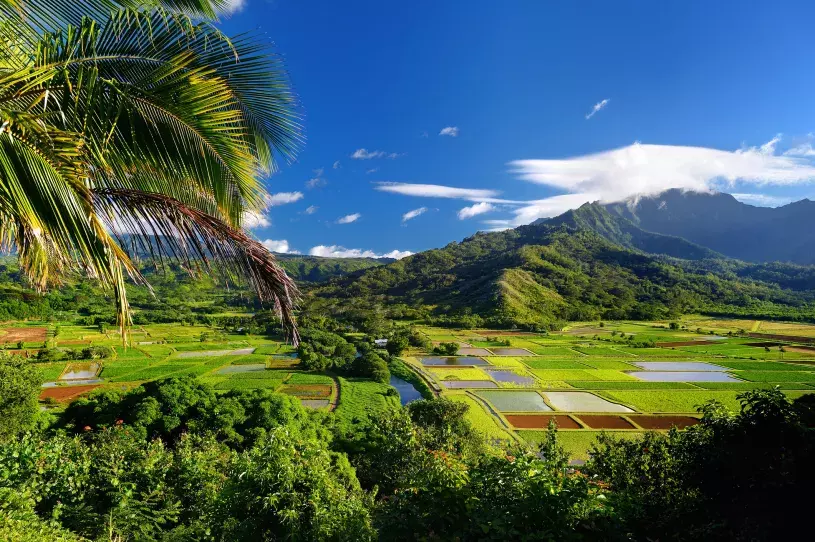Error message

By Laura Brewington
HONOLULU (18 September 2020)—Resilient and healthy ecosystems help prevent wildfires, flooding, and other natural disasters. As the COVID-19 crisis illustrates, the unsafe exploitation of the natural environment can also have a lasting impact on population health and economic growth. In addition, damage to ecosystems can affect food and water security, and even political stability. All of these factors make up a broader notion of ecological security.
What is needed now is a reassessment of how societies prioritize the preservation of healthy ecosystems to support human health and well-being. This concept, often called “Planetary Health” or the “One Health” framework, views biodiversity management, land-use practices, and food production systems as dynamic interconnections among the plants, animals, and people that make up an ecosystem. The health and ecological challenges that the world faces today can only be addressed by widespread adoption of this approach.
Environmental exploitation and COVID-19
The current pandemic can be seen as a fundamental example of what happens when we do not understand the interconnections inherent in Planetary Health. Researchers are still determining exactly how the novel coronavirus emerged in the human population, but public health experts agree that a combination of encroachment on natural habitats, unsafe exploitation of wild animals, and unsanitary food markets created the conditions for an outbreak.
Wild food collection and consumption can be important for rural communities. When wild animals are brought into population centers and kept in cramped, unsanitary conditions, however, conditions are ripe for diseases to emerge and move into human populations. The so-called “wet markets” found in many Asian countries provide a striking example. At the same time, habitat disruption and destruction allow both wild and domestic animals to come into close contact with humans—for example, when unplanned and unregulated urban expansion encroaches on natural habitats and farmland. Such close contact, without appropriate public health measures, creates the perfect conditions for an infectious disease to “jump” from an animal to a human host.
This is hardly a new phenomenon. Research in the Amazon has shown that deforestation led to malaria outbreaks in nearby communities when the host mosquito species—which primarily fed on monkeys living in the tree canopy—was suddenly brought into contact with humans. Similarly, rapid deforestation and forest fragmentation in Central and West Africa are believed to have triggered the transfer of the Ebola virus from fruit bats to local populations.
Island ecosystems and health
Islands exemplify the fundamental linkages between natural-resource management and human wellbeing. Some island communities rely primarily on healthy ecosystems for sustainable food and water supplies, while others depend on imported food and income from tourism for survival. And while there have been many failures, examples of the successful management of island ecosystems offer useful templates for the wider world.
Since the outbreak of the coronavirus pandemic, several island nations and territories have closed their borders to incoming travelers and freight shipments. As supply chains were disrupted or completely cut off, island residents have been forced to adapt.
In the island nation of Tonga, the Ministry of Agriculture and Food, Forests, and Fisheries distributed seeds to households and communities in order to encourage residents to plant their own fruit and vegetable gardens instead of relying solely on shipments from nearby New Zealand. The non-profit organization Para La Naturaleza in Puerto Rico, which promotes small-scale agro-ecological practices as an alternative to large-scale monoculture, expanded a program, originally designed to offer relief after extreme events such as hurricanes, to link farms directly with consumers. As one farm owner noted, “With COVID, a lot of new people have become customers, helping them know that there is a farmer in their community and that they don't necessarily have to go shopping in supermarkets.” Both of these cases offer excellent examples of islands adapting in the face of coronavirus-induced food insecurity and making a shift toward healthier, more sustainable agricultural practices.
Hawaiʻi Green Growth (HGG) and the Global Islands Partnership (GLISPA) recently launched a virtual forum for people in island communities around the world to communicate and share success stories about adaptation during the COVID-19 pandemic. This platform—part of the United Nations Local2030 Islands Network—took a three-pronged approach toward strengthening island solutions and building resilience, not only in response to the ongoing pandemic, but in the context of many global sustainability challenges including climate change.
In Hawaiʻi, a network survey first identified projects, policies, and innovations that could help shape the state’s recovery efforts and stabilize the economy after the collapse of the tourism industry. HGG’s Aloha+ Dashboard—a tool for tracking Hawaiʻi’s progress toward meeting its commitments to the United Nations Sustainable Development Goals—was updated to feature COVID-19 data, public health preparedness, and response efforts. Finally, a webinar series launched in April 2020 invites island stakeholders and leaders to share solutions and communicate challenges related to recovery and resilience.
Global opportunities
Worldwide, healthy ecosystems and the services they provide play a significant role in sustaining livelihoods, cultures, and economic growth. As the current pandemic has shown, they also protect global health. Organizations around the world, including the US-based Planetary Health Alliance, increasingly focus on how human-caused disruptions of Earth's natural systems have harmful impacts on human health.
In 2019, the United Nation’s Intergovernmental Science-Policy Platform on Biodiversity and Ecosystem Services released a global assessment report that outlined five critical challenges for protecting biodiversity and ecosystem health: changing how we use land and water; eliminating unsustainable extraction and trade; reducing pollution; limiting the spread and impacts of invasive species; and mitigating the effects of climate change. Understanding and acting on these challenges require coordinated, multi-national efforts.
The current pandemic has demonstrated deep insecurities in global public health and safety systems. At the same time, ongoing work in island communities and elsewhere demonstrates bright spots of adaptation and resilience through improved access to climate information, enhanced public-health systems, and better environmental conservation. Promoting Planetary Heath through ecological security must become an integral part of how we chart a path forward in a post-pandemic world.
###
Download a PDF version of this Wire article.
Laura Brewington is a Fellow in the Research Program at the East West Center.
The East-West Wire is a news, commentary, and analysis service provided by the East-West Center in Honolulu. All or any part of the Wire content may be used by media with attribution to the East-West Center or the person quoted. To receive Wire articles via email, subscribe here. For links to all East-West Center media programs, fellowships and services, see EastWestCenter.org/Journalists.
The full list of East-West Wires produced by the Research Program is available on the East-West Center website at EastWestCenter.org/Research-Wire. For more on the East-West Center Research Program, see EastWestCenter.org/Research.
The East-West Center promotes better relations and understanding among the people and nations of the United States, Asia, and the Pacific through cooperative study, research, and dialogue.
Series editors:
Derek Ferrar
[email protected]
Sidney B. Westley
[email protected]
Photo: Agricultural system with taro fields in Kauai, Hawaiʻi. Credit: maximkabb/Getty Images
By Laura Brewington
HONOLULU (18 September 2020)—Resilient and healthy ecosystems help prevent wildfires, flooding, and other natural disasters. As the COVID-19 crisis illustrates, the unsafe exploitation of the natural environment can also have a lasting impact on population health and economic growth. In addition, damage to ecosystems can affect food and water security, and even political stability. All of these factors make up a broader notion of ecological security.
What is needed now is a reassessment of how societies prioritize the preservation of healthy ecosystems to support human health and well-being. This concept, often called “Planetary Health” or the “One Health” framework, views biodiversity management, land-use practices, and food production systems as dynamic interconnections among the plants, animals, and people that make up an ecosystem. The health and ecological challenges that the world faces today can only be addressed by widespread adoption of this approach.
Environmental exploitation and COVID-19
The current pandemic can be seen as a fundamental example of what happens when we do not understand the interconnections inherent in Planetary Health. Researchers are still determining exactly how the novel coronavirus emerged in the human population, but public health experts agree that a combination of encroachment on natural habitats, unsafe exploitation of wild animals, and unsanitary food markets created the conditions for an outbreak.
Wild food collection and consumption can be important for rural communities. When wild animals are brought into population centers and kept in cramped, unsanitary conditions, however, conditions are ripe for diseases to emerge and move into human populations. The so-called “wet markets” found in many Asian countries provide a striking example. At the same time, habitat disruption and destruction allow both wild and domestic animals to come into close contact with humans—for example, when unplanned and unregulated urban expansion encroaches on natural habitats and farmland. Such close contact, without appropriate public health measures, creates the perfect conditions for an infectious disease to “jump” from an animal to a human host.
This is hardly a new phenomenon. Research in the Amazon has shown that deforestation led to malaria outbreaks in nearby communities when the host mosquito species—which primarily fed on monkeys living in the tree canopy—was suddenly brought into contact with humans. Similarly, rapid deforestation and forest fragmentation in Central and West Africa are believed to have triggered the transfer of the Ebola virus from fruit bats to local populations.
Island ecosystems and health
Islands exemplify the fundamental linkages between natural-resource management and human wellbeing. Some island communities rely primarily on healthy ecosystems for sustainable food and water supplies, while others depend on imported food and income from tourism for survival. And while there have been many failures, examples of the successful management of island ecosystems offer useful templates for the wider world.
Since the outbreak of the coronavirus pandemic, several island nations and territories have closed their borders to incoming travelers and freight shipments. As supply chains were disrupted or completely cut off, island residents have been forced to adapt.
In the island nation of Tonga, the Ministry of Agriculture and Food, Forests, and Fisheries distributed seeds to households and communities in order to encourage residents to plant their own fruit and vegetable gardens instead of relying solely on shipments from nearby New Zealand. The non-profit organization Para La Naturaleza in Puerto Rico, which promotes small-scale agro-ecological practices as an alternative to large-scale monoculture, expanded a program, originally designed to offer relief after extreme events such as hurricanes, to link farms directly with consumers. As one farm owner noted, “With COVID, a lot of new people have become customers, helping them know that there is a farmer in their community and that they don't necessarily have to go shopping in supermarkets.” Both of these cases offer excellent examples of islands adapting in the face of coronavirus-induced food insecurity and making a shift toward healthier, more sustainable agricultural practices.
Hawaiʻi Green Growth (HGG) and the Global Islands Partnership (GLISPA) recently launched a virtual forum for people in island communities around the world to communicate and share success stories about adaptation during the COVID-19 pandemic. This platform—part of the United Nations Local2030 Islands Network—took a three-pronged approach toward strengthening island solutions and building resilience, not only in response to the ongoing pandemic, but in the context of many global sustainability challenges including climate change.
In Hawaiʻi, a network survey first identified projects, policies, and innovations that could help shape the state’s recovery efforts and stabilize the economy after the collapse of the tourism industry. HGG’s Aloha+ Dashboard—a tool for tracking Hawaiʻi’s progress toward meeting its commitments to the United Nations Sustainable Development Goals—was updated to feature COVID-19 data, public health preparedness, and response efforts. Finally, a webinar series launched in April 2020 invites island stakeholders and leaders to share solutions and communicate challenges related to recovery and resilience.
Global opportunities
Worldwide, healthy ecosystems and the services they provide play a significant role in sustaining livelihoods, cultures, and economic growth. As the current pandemic has shown, they also protect global health. Organizations around the world, including the US-based Planetary Health Alliance, increasingly focus on how human-caused disruptions of Earth's natural systems have harmful impacts on human health.
In 2019, the United Nation’s Intergovernmental Science-Policy Platform on Biodiversity and Ecosystem Services released a global assessment report that outlined five critical challenges for protecting biodiversity and ecosystem health: changing how we use land and water; eliminating unsustainable extraction and trade; reducing pollution; limiting the spread and impacts of invasive species; and mitigating the effects of climate change. Understanding and acting on these challenges require coordinated, multi-national efforts.
The current pandemic has demonstrated deep insecurities in global public health and safety systems. At the same time, ongoing work in island communities and elsewhere demonstrates bright spots of adaptation and resilience through improved access to climate information, enhanced public-health systems, and better environmental conservation. Promoting Planetary Heath through ecological security must become an integral part of how we chart a path forward in a post-pandemic world.
###
Download a PDF version of this Wire article.
Laura Brewington is a Fellow in the Research Program at the East West Center.
The East-West Wire is a news, commentary, and analysis service provided by the East-West Center in Honolulu. All or any part of the Wire content may be used by media with attribution to the East-West Center or the person quoted. To receive Wire articles via email, subscribe here. For links to all East-West Center media programs, fellowships and services, see EastWestCenter.org/Journalists.
The full list of East-West Wires produced by the Research Program is available on the East-West Center website at EastWestCenter.org/Research-Wire. For more on the East-West Center Research Program, see EastWestCenter.org/Research.
The East-West Center promotes better relations and understanding among the people and nations of the United States, Asia, and the Pacific through cooperative study, research, and dialogue.
Series editors:
Derek Ferrar
[email protected]
Sidney B. Westley
[email protected]
Photo: Agricultural system with taro fields in Kauai, Hawaiʻi. Credit: maximkabb/Getty Images
East-West Wire
News, Commentary, and Analysis
The East-West Wire is a news, commentary, and analysis service provided by the East-West Center in Honolulu. Any part or all of the Wire content may be used by media with attribution to the East-West Center or the person quoted. To receive East-West Center Wire media releases via email, subscribe here.
For links to all East-West Center media programs, fellowships and services, see www.eastwestcenter.org/journalists.







